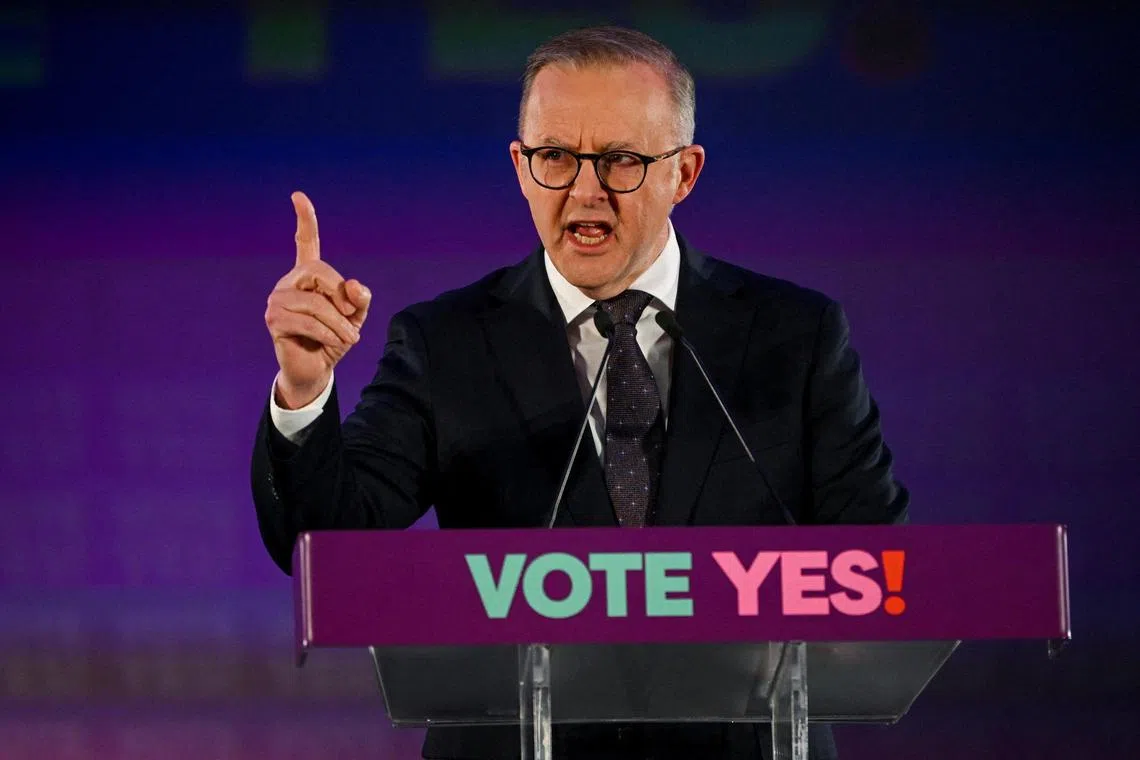Australian PM’s hopes for unifying aboriginal referendum dashed as debate turns toxic
Sign up now: Get insights on Asia's fast-moving developments

Mr Anthony Albanese said the moves will allow Australia to “move forward” from its sorry legacy of racism and violence towards aboriginal people.
PHOTO: REUTERS
SYDNEY – On the eve of his election as Australia’s prime minister in 2022, Mr Anthony Albanese promised to hold a referendum on aboriginal rights
But the referendum – to be held on Oct 14 – has not turned out to be the elevating, nation-changing moment Mr Albanese had envisaged.
Instead, it has descended into a divisive, toxic debate
The referendum proposes to grant recognition of aboriginal people in the nation’s Constitution and give them a “Voice” in Parliament that would allow them to have a say on government decisions that affect them.
Mr Albanese said the moves will allow Australia to “move forward” from its sorry legacy of racism and violence towards aboriginal people, who have disproportionately high levels of imprisonment and poverty, and poor health and education outcomes.
Writing in Sydney’s The Daily Telegraph on Friday, Mr Albanese urged people to support the referendum, saying it would help to achieve “real progress on issues like health and education”.
“Voting ‘yes’ won’t fix everything overnight, but it will mean we finally have the right approach in place to start finding the answers,” he wrote.
“Voting ‘no’ means closing the door on practical progress that will help people live better lives.”
But the proposal has run into strident opposition.
Critics, including opposition leader Peter Dutton, who heads the Liberal-National Coalition, say it will lead to legal challenges and will create racial divisions by giving a formal role in decision-making to indigenous people.
The debate has been intensifying in recent weeks as the referendum draws nearer, and, unfortunately, it has turned increasingly bitter and vitriolic.
Opponents of the Voice have claimed – falsely – that voting “yes” will result in the abolition of Australia Day, a national holiday, or will result in the end of Parliament or in non-aboriginal people having to pay to live in Australia, or in names of cities and other places being replaced with aboriginal titles.
Memes on social media have depicted aboriginal people as “primitives” and included racial slurs and stereotypes.
According to a report in The Sydney Morning Herald earlier in September, the “no” camp has deliberately attempted to run a scare campaign and has instructed its volunteers to spread a “feeling of uncertainty, of fear or doubt”.
Opinion surveys indicate that the tactic is working.
Support for “yes” has plunged from 64 per cent in August 2022 to 44 per cent, while support for “no” has increased from 36 per cent to 56 per cent, according to an average of all national polls published by ABC News.
To win, the referendum must not only receive a majority of votes nationally, but a majority in at least four of Australia’s six states. Voting in the referendum is compulsory.
The government and “yes” supporters have decried the ugly tone of the campaign, yet experts on Australian referendums say that the dwindling support for the Voice and the ugly debate are not particularly surprising.
Dr Benjamin Jones, a historian at Central Queensland University, said Mr Dutton’s decision to oppose the Voice means that the referendum lacks bipartisan support and is much less likely to pass, as the changes become subject to a politicised debate.
Just eight of 44 referendums have passed in Australia, and none has passed without bipartisan support.
“Referendums are already difficult to pass in Australia, but they border on impossible if they don’t have bipartisan support,” he told The Straits Times.
“You are dealing with a complex issue and a low level of public knowledge about the change or about the Constitution. You create an atmosphere where fear campaigns and blatant falsehoods can go unchecked… It has ended up becoming divisive because partisan politics has taken over.”
Still, the divisions have not silenced advocates of the change from making a passionate case, even if their arguments are at risk of being drowned out by the politicking and fearmongering.
A leading “yes” campaigner, Mr Thomas Mayo, who is an Indigenous Australian, said in a speech in August that the Voice is designed to give aboriginal people responsibility for improving their lives and communities.
“We are sick and tired of policies that fail,” he said.
“Indigenous people want to take responsibility for our lives... We do take responsibility, and that is why we have called for a constitutionally enshrined voice.”
Dr Jones said the misinformation campaign had featured material that appeals to racist tropes such as claims that aboriginal people – who make up about one million of the nation’s 26.8 million residents – have more rights or receive more public benefits than the non-aboriginal population.
But he said he did not believe the looming failure of the referendum means that a majority of Australians subscribe to such views.
“Most Australians have a lot of goodwill towards First Nations people,” he said.
“Like in every society, there are elements of racism in Australia. Some of the ‘no’ campaign material appeals to those elements.”



